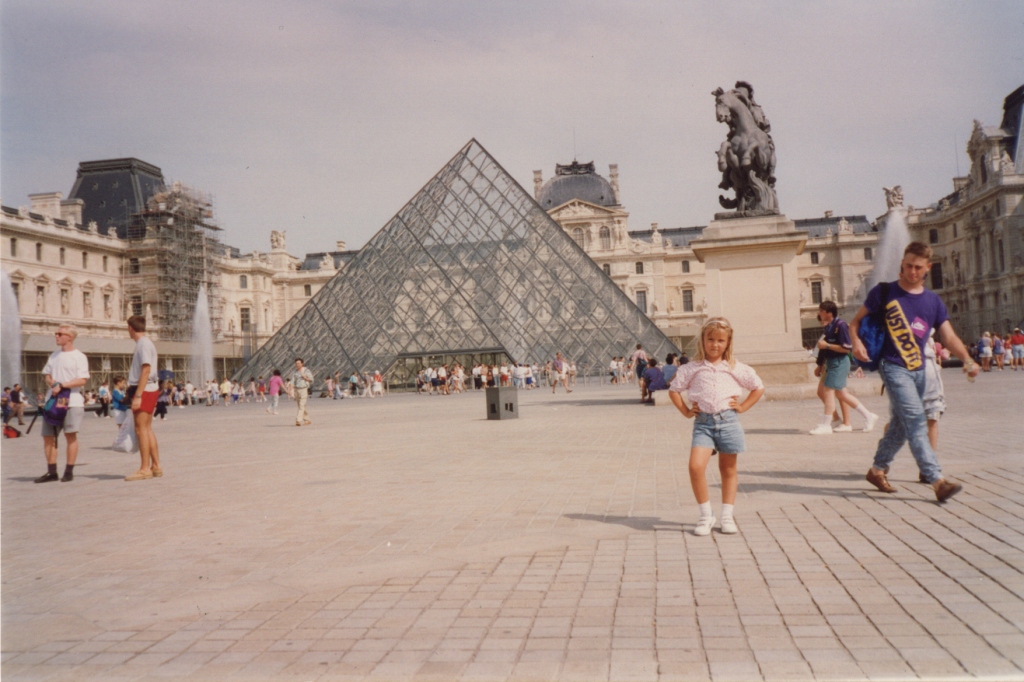- CA2M MUSEUM
- exhibitions
- CRISTINA GARRIDO. THE ORIGIN OF FORMS
CRISTINA GARRIDO. THE ORIGIN OF FORMS

Cristina Garrido, Louvre, 1992. Courtesy of the artist.
Curated by Tania Pardo.
The work of Cristina Garrido (Madrid, 1986) revolves around the study of the contemporary art system and how it assigns certain values related to different factors and players that can mean their legitimisation in this sector.
Her reflection focuses on what kind of processes exist for circulating images and what impact they have on artistic production and exhibition culture.
Since the beginning of her career, the artist has explored questions related to art education, the presence and impact of the market, the recording and distribution of images through social media, art spaces as places of representation (galleries, museums, fairs and biennials), professionals in the art system and the exhibition as an event.
Garrido has been focusing her work on being a reflection on the inner workings of contemporary art systems, analysing both their inequalities and structural discordances. Each of her creations is based on different stories that construct the context of art as understood to be a system of representation. And for this purpose, the artist appropriates supports and images, whether installations, interventions in magazines, museum postcards, performance art, photographs or videos.
The project, conceived specifically for the CA2M Museum and entitled The Origin of Forms, is based on the exhibition The Best Job in the World, held in 2021. In that project, Cristina Garrido investigated the figure of the artist who gives up art, by means of several conversations she held with Spanish artists who were active in the country’s different art scenes between the 1980s and early twentieth century. From her conversations with these people and the factors related to their leaving the profession, the artist began to wonder what the determining factors were when it came to continuing to devote oneself to art.
In her present project, she reflects on the determining factors that validate permanence in the art system, using her own personal history as the focus of this research. She uses the biographical method as a qualitative research methodology that incorporates the artist’s own life story while also focusing on what is expressed in official narratives and employing story-telling as part of the construction of this narrative.
For the first time, the artist will openly use her own experience to raise questions that cut across her entire practice and could be extrapolated to the rest of the art community, such as livelihood, origins, the social conditions in which an artist develops, academic training, social class, the social codes of the artistic context, intrahistory and legitimisation, among others.
ABOUT CRISTINA GARRIDO
Cristina Garrido (1986, Madrid, Spain) lives and works in Madrid. After studying Fine Art at the Complutense University of Madrid (2004–2009) and Camberwell College of Art (London, 2007–2008), she obtained an MA in Fine Art from Wimbledon College of Art (London, 2010–2011) with a scholarship from Fundació “la Caixa” for postgraduate studies in the United Kingdom. She was awarded the Fundación Montemadrid Generación 2015 Proyectos de Arte prize, the Botín Foundation arts grant (2017–2018) and the ARCO Prize for young artists (2018).
Her work has been exhibited internationally, including shows at the British Museum, London; On Curating Project Space, Zürich; Centro Botín, Santander; CA2M Museum, Móstoles; Centro Andaluz de Arte Contemporáneo (CAAC), Seville; CASS Sculpture Foundation, West Sussex; Centrale for Contemporary Art, Brussels; Contemporary Art Museum of Estonia - EKKM, Tallinn; CentroCentro, Madrid; Institut supérieur pour l'Etude du Langage plastique (ISELP), Brussels; MAC Birmingham; Espacio Odeón, Bogotá; Fundación Luis Soane, A Coruña; Centro de Desarrollo de las Artes Visuales, Havana; Taxispalais Kunsthalle Tirol, Innsbruck; SESC Sorocaba, Sorocaba/São Paulo; La Casa Encendida, Madrid; Lugar a dudas, Cali; Spike Island, Bristol; Matadero Madrid; and AKV St. Joost, Den Bosch, among others.